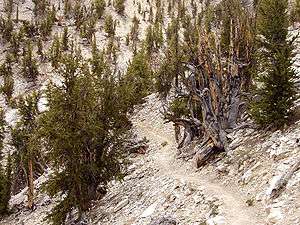Methuselah (tree)
| Methuselah | |
|---|---|
|
The Methuselah Grove | |
| Species | Great Basin bristlecone pine (Pinus longaeva) |
| Location | Ancient Bristlecone Pine Forest, in the White Mountains, Inyo County, California |
| Coordinates | 37°22′46″N 118°09′42″W / 37.3794°N 118.1618°WCoordinates: 37°22′46″N 118°09′42″W / 37.3794°N 118.1618°W |
| Date seeded | 2830 BCE |
| Custodian | U.S. Forest Service |
Methuselah is a 4,848-year-old[1] Great Basin bristlecone pine (Pinus longaeva) tree growing high in the White Mountains of Inyo County in eastern California.[2][3] For many years it was thought to be the world's oldest known living non-clonal organism, until it was superseded in 2012 by the discovery of another bristlecone pine in the same area with an age of 5,066 years (germination in 3050 BCE).[4]
Geography
Methuselah is located between 2,900 and 3,000 m (9,500 and 9,800 ft) above sea level in the "Methuselah Grove" in the Ancient Bristlecone Pine Forest within the Inyo National Forest. Its exact location has not been publicly disclosed.[5][6]
Status as oldest known tree
Methuselah was 4,789 years old when sampled (likely in 1957) by Edmund Schulman and Tom Harlan,[1] with an estimated germination date of 2833 BCE. Methuselah was for many years considered the world's oldest living tree, until 2012 when an older bristlecone pine was discovered and later announced in 2013.[4]
Other ancient trees
Bristlecones
Another bristlecone specimen, WPN-114, nicknamed "Prometheus", was more than 4,844 years old when cut down in 1964, with an estimated germination date of 2880 BCE. A dendrochronology, based on these trees and other bristlecone pine samples, extends back to about 9000 BCE, albeit with a single gap of about 500 years.[7][3]
Clonal organisms
Other, longer-lived discoveries are clonal colony organisms, such as the 80,000-year-old Quaking Aspen (Populus tremuloides) clonal colony named "Pando" in the Fish Lake National Forest in south-central Utah; the 11,700-year- old Creosote bush (Larrea tridentata) clonal colony, named "King Clone", in the Mojave Desert near the Lucerne Valley in California; and the 9,500-year-old Norway spruce (Picea abies) clonal colony named "Old Tjikko" in Sweden.[8][9][10]
See also
References
- 1 2 "Pinus longaeva". Gymnosperm Database. March 15, 2007. Retrieved 2015-01-04.
- ↑ "Ancient Bristlecone Pine Forest". USFS. Retrieved March 11, 2013.
- 1 2 "Ancient Bristlecone Pine Natural History". USFS. Retrieved March 11, 2013.
- 1 2 "Rocky Mountain Tree-Ring Research OldList". Retrieved 6 January 2013.
- ↑ Kinkead, Gwen (June 17, 2003). "At Age 4,600-Plus, Methuselah Pine Tree Begets New Offspring". New York Times.
- ↑ Methuselah Walk. U.S. Forest Service/Eastern Sierra Interpretive Association.
- ↑ Hall, Carl (1998-08-23). "Staying Alive". San Francisco Chronicle.
- ↑ Vasek, Frank C. (Feb 1980). "Creosote Bush: Long-Lived Clones in the Mojave Desert". American Journal of Botany. 67 (2): 246–255. doi:10.2307/2442649.
- ↑ "Larrea tridentata - King Clone". High Country News.
- ↑ "World's Oldest Living clonal tree, 9550 years old, Discovered In Sweden". Science Daily.
External links
- www.fs.usda.gov — Inyo National Forest official Ancient Bristlecone Pine Forest site
- www.fs.usda.gov — Inyo National Forest: The Natural History of the Bristlecone Pines
